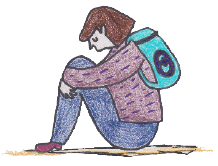“If you’re here and you’re struggling, you’re still here.”
So went the words of a particularly observant American Studies teacher to a certain 16-year-old student — as she anxiously stuffed The Great Gatsby into a messy North Face backpack — at the end of first period, on Wednesday, February 22nd.
“Don’t forget that.”
I rose and straightened my glasses. With a tight-lipped smile and a deep breath, I swung the backpack onto my back and prepared to leave.
“Thanks, Dr. Copprue. Don’t worry, I know.”
Slightly brightened by my teacher’s kind words, my day continued. First period bled into second, fifth into sixth, track practice into dinner, followed by a few slightly frantic hours in the library. Just as day turned into night, I sat before a slightly battered journal, jotting down my only conclusion from this relatively ordinary day.
Today was good.

My nightly musings explained how, exactly, that conclusion came to be, especially after a rather dismal morning. The dining hall served pumpkin chocolate chip cookies at lunch. Thermometers tipped past forty for the first time in months. The boy I spend too much time thinking about stopped to ask how I liked The Great Gatsby. But maybe, the fact that someone noticed how I was doing — and cared — was enough to render my day “good.”
Even if the 9AM clouds seemed particularly ominous that morning, even if I had to wade through a snow bank to get from my dorm to the dining hall, just a few little moments brought enough sunlight to illuminate the sometimes-hidden goodness in an ordinary day.
Finding that goodness is a luxury.
Finding that goodness in the middle of winter is even more remarkable.
New Englanders know this all too well: winters are hard. Winters at Deerfield can be especially hard. There’s something about darkness before 5 PM and masses of students in analogous black parkas that tugs at the heartstrings of the entire Academy.
We forget what it feels like to order Cookie Combustion ice cream from Richardson’s on a Saturday in May. We forget what the Main School Building looks like without a crown of snow.
But just as quickly as we descend into what William Carlos Williams calls “the desolate, dark weeks,” most Deerfield students are lucky enough to discover something special: as the daffodils outside the Hess Center begin to bloom, so do we. Perhaps, even before the snow melts, you’ll begin to realize the hope inherent in the month of February. Maybe you’ll realize: hope can present itself in the smallest of moments.
Deerfield students may be united in the common sadness of winter. But — by and large — we are also united in the common hope of spring. Buds bloom, snow subsides, and grass grows. The hardness of winter melts away.
At least, for most of us.
April stickball games on the green may allow lots of students to bid winter blues adieu. However, springtime brings a new plight for a significant portion of Deerfield’s student population: those struggling with clinical depression.
In The Waste Land, T.S. Eliot wrote, “April is the cruelest month.” Though this statement may appear to just be a cynical, poetic observation, it also indicates a larger problem for those who suffer from major depressive disorder — like Eliot himself.
Most of the world’s population is able to defrost as the seasons turn. But for those suffering from depression, seeing everyone around them bloom causes them to sink even deeper. As a family member suffering with depression once told me, “It’s like drowning, but you can see everyone around you swimming just fine.”
Depression is easy to ignore and difficult to understand. During a tough week of tests, sports games and friend struggles, it’s easy for any of us to forget what it’s like to feel happy. But, as quickly as you may forget, little things can help you remember. For those with depression, making that switch isn’t as simple.
According to the 2017 State of the Academy Report, conducted by renowned psychologist and researcher Suniya Luthar, about 9.6% of Deerfield’s student population suffers from some form of major depressive disorder. This is a staggering number, almost twice the national average. It’s difficult to ascertain whether this is a reaction to Deerfield’s high-pressure environment, both socially and academically, but one thing is certain: something must be done.
When the grass outside of the Hess center is finally green again, enjoy it. Relish the sunshine, put on those flip-flops and laugh with your friends while eating popsicles outside the dining hall. But don’t forget that springtime happiness is not a uniform reality — at Deerfield and beyond.
Continue to be observant. Continue to care.
When an anxious freshman girl asks you, “It gets better, right?” don’t simply brush off her worries as naïve. Rather, answer that yes, ‘it’ does get better, but sometimes it takes a little more work to get better.
Sometimes, ‘it’ takes talking to a counselor during your free period. Sometimes, ‘it’ takes medication. Direct those you see struggling to the myriad of resources Deerfield has to offer: four school counselors, sixteen peer counselors, and dozens of faculty and students who are ready to listen at any time. Don’t forget how much parents can help as well.
Be that person who reminds others of Dr. Copprue’s simple, but fundamentally powerful truth: “If you’re here, and you’re struggling, you’re still here.”
You’re still here. Don’t forget that.

